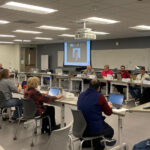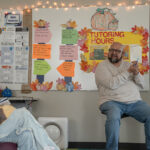In the spring of 2016, Jose Flores found himself the center of unwanted attention at Texas A&M University-San Antonio’s advising center.
Flores, a special education K-12 senior, suffered an episode of intense anxiety at the advising center in the Madla Building that resulted in the University Police Department getting involved, followed by a student code of conduct hearing.
Flores was allowed to continue his studies and subsequently received a letter to inform him the school would be implementing some form of PTSD related training. The university provides counseling services but lacks any specific action plan for veterans with PTSD that experience anxiety issues while on campus.
Dr. Melissa Mahan, vice president for Student Affairs, said the school treats veterans with PTSD the same as it does all of the university’s students.
“So we have a code of conduct that all of our students have to abide by.” Mahan said. “If there’s a violation of the code of conduct we bring that student in, we talk with them and we figure out what’s going on with that situation and, whether they are found responsible or not, there could be potential sanctions or things put on the student.”
Flores’s anxiety stems from post-traumatic stress disorder (PTSD) from his time in the U.S. Marines, and from a traumatic brain injury that occurred in March of 2013 at Fort Hood, Texas when he was working for the Department of the Army.
During spring semester of this year, Flores was assigned a new academic advisor and began to experience anxiety symptoms when the advisor told him he was doing things incorrectly.
“Don’t get me upset, because I’m a veteran, and I have all this anxiety stuff,” Flores said.
The discomfort he felt caused him to ask for a different advisor, but he was denied and the advisor turned the situation over to her supervisor.
Flores said he felt that he was being treated like a child when they asked him to sit in the hallway outside of the advisement center’s main office.
He admits that sometime during the encounter he used at least one expletive.
“They couldn’t see what was wrong. All they saw was the verbal and visual cues,” he said. “They didn’t notice anything wrong with me. I was having an anxiety attack. These civilians think that anxiety is just a frame of mind.”
While he waited in the hall, he texted his wife. His text to her read: ‘Honey, I’m having a nervous breakdown.’
Flores then contacted his psychiatrist at the Veteran’s Administration and Disability Support Services.
Approximately 15 minutes later, case manager Courtney Garza and Military Community Liaison Tim Smith arrived at the advising center.
University Police was already on the scene.
“One officer was nice, but not the other one,” Flores recounted.
“Tim and Courtney took me downstairs and then to the library,” Flores said. “They were trying to calm me down. I was already upset.”
Flores had asked for a letter that he could provide to Military Affairs and counseling that would inform them that the advising center could not help him but he did not receive one.
At the hearing, Flores received assistance from Sarah K. Ramseur, director of disability support services and Cynthia Teniente-Matson, president of Texas A&M San Antonio, was involved in the hearing.
Flores said that Ramseur was an excellent resource and that President Matson is a great person who knows how to read people.
A need to be understood
Another veteran student, Juan Sanchez said, “I have had moments of anxiety but nothing that the school has had to get involved in. I get irritated very easily. I can’t seem to function when I’m irritated.”
He doesn’t like people honking, whistling, or staring at him. This is a common symptom for those who suffer from PTSD.
Sanchez said he has been belittled, told he is old and asked why he is attending college.
He is in the process of getting evaluated through the VA.
While he recognizes the need for proper diagnosis of his disability so he can receive compensation, Sanchez said, “At the same time you lose a lot of privileges when you’re tied to PTSD.”
Sanchez believes his PTSD began when he was 5 years old.
His family was poor, his brother had died and he had to help his father dig a grave to bury him in.
He enlisted in the US Army at age 17, in June of 1973.
“In certain situations and times in my life, I have encountered quite a bit of death. Vietnam did not help,” Sanchez said. “Some of us handled it better than others. Some of us came back okay. Some of us didn’t.”
As Texas A&M- San Antonio forges ahead into the future, faculty and administration have had to quickly and strategically come to terms with identifying and branding the institution a military-embracing university.
Services the university offers its veterans
The university has different policies depending on what the presenting concerns are, said Rachel Lutz, LCSW, Director of Counseling & Wellness.
“Not everyone presenting with PTSD issues is a veteran and not everyone with PTSD presents the same,” Lutz said. “If a presenting student were to become aggressive, the University Police would respond and they have their own policies and procedures around that.”
Lutz said the school does have a behavioral intervention team comprised of staff from student affairs, director of the counseling department, director of military affairs, disability support services and student rights and responsibilities that would come together to de-escalate and/or mitigate the issue.
The campus faculty received training in Military Cultural Competence, prepared and presented by K.C. Kalmbach, Ph.D., assistant professor of psychology during summer 2016. The training is scheduled for staff during spring 2017, Lutz confirmed.
Lutz, who has held her position since January, said that the Student Counseling and Wellness Services clinic offers evidenced-based treatment such as cognitive processing therapy, a process designed to help those suffering from a traumatic experience to properly process the event and used often by the VA, and prolonged exposure therapy.
Evidence based treatment has been studied to show evidence that it is effective in care, like symptom improvement.
The latest treatment the clinic has acquired is eye movement desensitization and reprocessing, which is very expensive and not covered by most insurances. The treatment can be effective in as few as one to four sessions.
The clinic does track veteran students differently in its treatment system for the purpose of patient retention, but it does not have the ability to track success of veteran students academically.
Lutz said the clinic maintains above a 75 percent retention rate.
The clinic has four clinicians, including Lutz, who are licensed professional counselors, and one intern.
“The intent is to create an equal playing field for them in life and we want them to be successful. We can approach issues and situations from a lot of different angles to make students the most comfortable,” Lutz said. “And we do a lot of interventions here: art therapy, music therapy, and movement therapy. A lot of things that are difficult to access in the community. There is no wait time so there’s not a lot of barriers that exist here. And we have a lot of willingness to be flexible.”
Offering support to those who served
Flores signed up for counseling and disability services when he first came to the school spring 2014.
He provided his VA disability paperwork to those offices believing that he would be walked through the process, to include explanation of his disabilities to his professors but these are not services that are provided by the university.
Although Flores received assistance from the counseling office, it wasn’t at the level he thought he’d get it at.
If those offices cannot provide services, the student will be connected to someone who can.
Sanchez said Lutz was very kind and helpful to him by providing him with pamphlets and pertinent contact information.
The office of Military Affairs, located in Patriots’ Casa, is another campus office that provides assistance to veterans.
Richard Delgado, director of Military Affairs & Army ROTC advocates for veteran services on campus.
“Being a veteran myself and as the director of Veteran Affairs, the message that I feel, especially on a veteran-embracing campus, is that we have plenty of resources for our veterans. With or without mental illness. With or without PTSD,” he said.
Delgado said there are programs and support mechanisms not only through his office but through counseling and wellness to provide resources around a veteran.
“Whether we seek them out or not is totally individual but there are more resources and support elements that are here for all generations where our Vietnam brothers and sisters didn’t get a welcome home so they kind of hung up their uniform and locked it away,” Delgado said. “And now more slowly and deliberately they are saying ‘hey I did serve.’”
In regards to responding to a situation where a veteran is having a stressful incident, Delgado said: “Overall, just don’t rush to judgement. Allow the process to play out if something does occur but don’t be fearful, regardless if it is a veteran or not.”
Flores and Sanchez agree that a veteran displaying PTSD related issues needs time to normalize, and that it is best for other students to remain quiet or to remove themselves from the location.
Delgado recommends that non-veteran students talk to veteran students.
Flores and Sanchez both had advice for non-veteran students approaching a veteran for the first time:
Flores said that veterans give physical cues that they want to be left alone.
“We have instincts like animals,” Flores said. “We decide who we want to interact with by their behavior in the classroom.”
A veteran can tell within a few moments if they want to talk to a person or not when they are approached Sanchez said.
Sanchez said, “Don’t talk down to us because of our age, or because we’re missing a leg or arm.”
“Some people come to me because they think I know something because of my age. I’m willing to help those who are willing to accept help,” Sanchez said.






